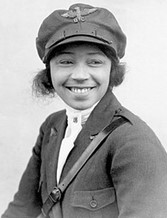Rationale for Inclusion
- First African American Woman Pilot: Bessie Coleman became the first African American woman and the first Native American to earn a pilot’s license, achieving this historic milestone in 1921. At a time when racial and gender discrimination were pervasive, especially in fields like aviation, Coleman overcame significant barriers to pursue her dream of flying. Her achievements challenged the limitations society imposed on both women and African Americans, breaking new ground for future generations of aviators.
- Pioneering Journey to France for Flight Training: Faced with a lack of opportunities in the United States, where flight schools refused to admit her due to her race and gender, Coleman boldly traveled to France to pursue her aviation dreams. She enrolled in the prestigious Caudron Brothers’ School of Aviation in Le Crotoy and earned her international pilot’s license from the Fédération Aéronautique Internationale.
- Aviation Stunt Performer and “Queen Bess”: After earning her pilot’s license, Bessie Coleman returned to the U.S. and began a career as a barnstormer and stunt pilot. Known for her daring aerial tricks and captivating performances, she earned the nickname “Queen Bess” and became one of the most popular aviators of her time.
- Advocate for Equality and Inclusivity in Aviation: Bessie Coleman was deeply committed to promoting racial and gender equality within aviation. She refused to perform at venues that discriminated against African Americans and actively encouraged other African Americans to pursue careers in aviation. Coleman’s ultimate dream was to establish a flight school for African Americans, where she could provide the training opportunities that were denied to her in the United States. Although her life was tragically cut short, her vision for a more inclusive aviation industry laid the foundation for future initiatives to support underrepresented communities in aviation.
- Trailblazer Who Paved the Way for Future Aviators: Coleman’s achievements as an aviator helped pave the way for other African American and female aviators, such as the Tuskegee Airmen and Willa Brown. By defying the societal constraints of her time and proving that race and gender were not barriers to success in aviation, Coleman helped open doors for future aviators. Her groundbreaking accomplishments made her an enduring icon in the history of aviation and civil rights.

Biography
- Early Life and Education: Bessie Coleman was born on January 26, 1892, in Atlanta, Texas, into a family of sharecroppers. She grew up in poverty and faced racial and gender discrimination from an early age, but she was determined to achieve more for herself. Coleman attended a one-room segregated school and later enrolled in Langston University in Oklahoma, though financial difficulties forced her to leave after one term.
- Personal Life: Bessie Coleman was known for her fearless personality, resilience, and independent spirit. She was deeply committed to her goals, especially in the face of the racial and gender discrimination prevalent in the early 20th century. Though her personal life remains largely undocumented, her pioneering achievements and unwavering ambition became an inspiration for the African American community. Coleman was dedicated not only to her own success but also to encouraging others to overcome societal barriers, and she dreamed of opening a flight school to support other African Americans in aviation.
- Early Career: Determined to become a pilot but unable to find training in the United States, Coleman traveled to France in 1920 to attend the Caudron Brothers’ School of Aviation. In 1921, she became the first African American woman and first Native American to earn a pilot’s license, making history.
- In recognition of his service to aviation Coleman received numerous awards and accolades, including:
- Induction into the National Aviation Hall of Fame (2006)
- Induction into the National Women’s Hall of Fame (2001)
- Induction into the International Air & Space Hall of Fame (2014)
